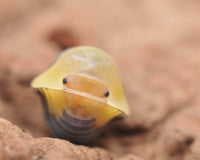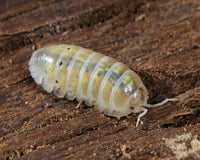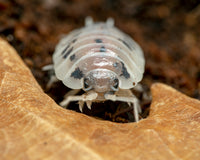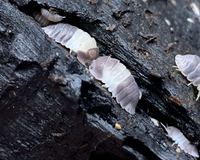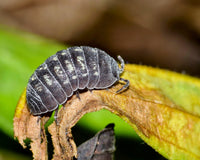The Rubber Ducky Isopod Discovery occurred in the dark and humid Limestone caves of Thailand in 2017! After the unbelievable discovery of this relatively brand new species, the buzz words now have become "Designer Isopod." The name Isopod, also known as rolly pollies, pillbugs, sowbugs, potato bugs, or woodlouse - is derived from the Greek word meaning "Equal Foot" isopods have an equal number of feet on each side of their body.
This Isopod, the Rubber Ducky, is THE most popular and sought-after rare and unique species. Most of you are familiar with the simple light or dark gray rolly pollies from your childhood. Let us inform you that there has been an explosion of popularity and collectability after the Rubber Ducky Isopod's discovery just a few short years ago.

Rubber Ducky Isopod Scientific Name
Kingdom Animalia (Animals)
Phylum Arthropoda (Arthropods)
Subphylum Crustacea (Crustaceans)
Class Malacostraca (Malacostracans)
Superorder Peracarida (Peracarida (Amphipods and Isopods))
Order Isopoda (Isopods)
Suborder Oniscidea (Woodlice)
Infraorder Holoverticata
No Taxon (Orthogonopoda)
No Taxon (Crinocheta)
Family Armadillidae
Cubaris sp: When we look closely at the Cubaris sp. from the front, their tiny heads resemble an actual yellow duckling's bill and face! These beloved isopods are known all over the world for their duck-like faces and color resemblance.
(See Photo Above)
These unique and rare isopod species are located in caves in Thailand. They are one of several relatively brand new southeastern Asian Cubaris, which have taken the entire isopod collection world by storm. Not only have they engulfed the Isopod hobby within the last few years, but this brand new species also has several varieties that are unidentified or not yet named scientifically.
Rubber Ducky Isopods enjoy higher humidity in their enclosure than your average isopods species. These rare and exotic isopods love having various places to hide and borrow and prefer to roam around on damp sphagnum peat moss.
Burrow Depth: 3" Minimum - Prefers 6"+
(Cubaris sp) Rubber Ducky Isopod Diet

It is recommended that your Rubber Ducky Isopods should always have constant and precise sources of protein, calcium, and leaf litter, as well as other additional nutritional sources.
Protein Sources: We have personally found that most Cubaris species enjoy consuming various protein sources, and this variety seems to keep these slower-growing species happy and breeding consistently.
- Shrimp Pellets (Fish Store)
- Shrimp Meal (Down To Earth)
- Shrimp Shells (Asian Markets)
- Organic (Non-GMO) Nutritional Yeast
- Cricket Insect Frass
Calcium Sources: Again, variety is the spice of life for these unique cave-dwelling isopods. They seem to reproduce with cuttlebone calcium, but species colonies begin to come alive and thriving with Limestone as their primary calcium source.
- Cuttlebone (Reptile Store)
- Limestone (Rubber Duckies Preferred)
- Emulsified Egg Shells (Powder Form)
- Sea Corral Calcium
- Organic Kefir
Pesticide-Free Leaf Litter: It is vital to remember when purchasing these designer isopods that we don't skimp on the last essential diet and habitat ingredient, known as leaf litter. Yes, we can gather leaves outside, but unless you are confident that those leaves are pesticide-free... Let me ask you a question; Are you willing to risk your brand new expensive and rare isopods to save $10 on leaves?
- Magnolia Leaves
- Oak Leaves
- CBD Hemp Leaves
- Cannabis Leaves
- Cover Crop (12 Seed Blends)

Rubber Ducky Isopod Living Soil Substrate
A well-built living soil - focused on diversity and building an extremely rich and vibrant substrate - begins with decaying wood mulch, decaying cork bark, plenty of Limestones, sphagnum peat moss, and organic leaf litter. These key foundational ingredients are essential for keeping these isopods and many other rare isopod species healthy and breeding.
Rubber Ducky Isopods love to consume dead organic material, preferably decaying old cork bark, and isopods are an essential part of many ecosystems. Rubber Ducky Isopods, as well as all beloved Isopods, belong to the Crustacean family, making them more closely related to Lobsters & Crabs than ordinary living soil-dwelling bugs or insects.
The goal as an Isopod farmer is to focus on building organic and bio-diverse soil systems while adding the necessary predatory biology to turn that new soil system into a utopia and microcosm of the old-growth redwood forest floor.
Rubber Ducky Isopod Breeding

Once acclimated, which at times can be a painfully slow process, Rubber Ducky Isopods are known to breed all year round. Relatively easy to look after, but not as forgiving as many commonly kept isopod species. It has been noted that the Cubaris sp, in particular, can live for several years with 2-10 sized broods. Advanced Isopod farmers have claimed larger brood sizes of 10-20+.
Rubber Ducky Isopod Care (Cubaris sp)
Isopod Basic Care Knowledge Level: Experienced
Isopod Preferred Temperatures: 70-82 F
Isopod Preferred Humidity: Moderate-High
Isopod Preferred Substrate Humidity: High Moisture Level
Rubber Ducky Isopods Favorite Foods: Cucumber & Sweet Potatoes
10-Gallon Living Soil Structure: 10-25 Isopods
20-Gallon Living Soil Structure: 25-50 Isopods
30 to 40-Gallon Living Soil Structure: 50-75 Isopods
75-Gallon Living Soil Structure And Up: 100+ Isopods
RDI Is Your Favorite Rubber Duckies Isopod Source!








